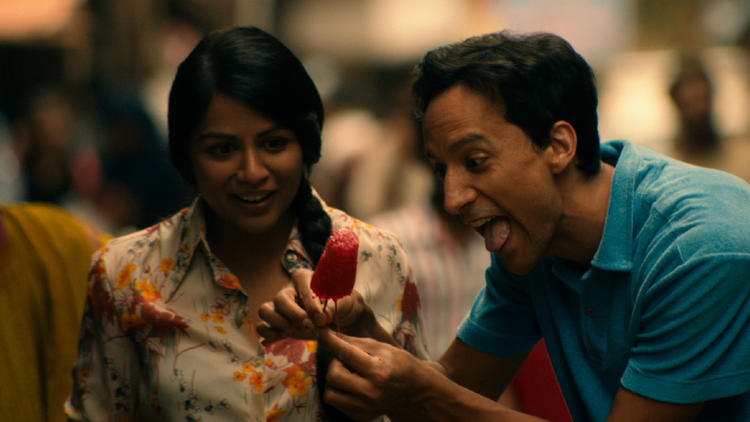
The Tiger Hunter and the Myth of the American Dream: A Film Review
By Christian Garcia
Set in the year 1979, The Tiger Hunter is an independent comedic film directed by Lena Khan. The film tells an immigrant love story surrounding a young Indian man named Sami who is seeking the opportunities America promises so that he can marry his life-long crush. Released in 2016, the film stars Danny Pudi as the protagonist amongst a great supporting cast of other Asian actors/actresses. Overall, The Tiger Hunter does a remarkable job combating the discourses of success in the United States. It demonstrates the struggles of the South Asian diasporic immigrant experience. This is particularly pertinent because there is a vacuum of media that engages South Asian diaspora experiences. It is no small feat to unpack the complex situations of the everyday experience of an immigrant and The Tiger Hunter magnificently accomplishes this. The film surprises the audience when it makes them laugh and reels them in when it moves them. A significant victory for this film was its ability to portray the entire Southeast Asian cast as people. The cast was charismatic, relatable, had aspirations, idiosyncrasies, and humanity. That the film portrayed complicated and flawed characters is essential because it disrupts the notion of the model minority. The Tiger Hunter’s actors’ character development is on full display, relaying a depth to each of the characters’ story, even if they had little dialogue.
Much of the film revolves around one man of great character who struggles with the unforgiving truth of the “American Dream”; it is a façade. At its core, The Tiger Hunter exposes the intricate ways migrants perceive the “American Dream” in contrast to their lived experiences pursuing it. Historically, the United States has promoted itself as the global beacon of freedom and the “land of opportunity”. However, because of the meritocracy that the United States is built on, in conjunction with the “hard work equals success” discourse, immigrants have quite a small margin for error. Furthermore, these discourses cause potential migrants to have certain expectations and are shocked when those expectations are not met. The audience witnesses this myth of opportunity play out in the daily lives of the characters and how the characters struggle against the structural conditions that “Other” their existence.
This conflict is exemplified when Sami goes to his American company and discovers his engineering job is no longer being offered. The audience is confronted with the manifestation of the façade of U.S. opportunity discourse. In an amusing reaction, Sami meets this news with a certain bafflement and disbelief. Instead of being alarmed, Sami attributes this turn of events to genuine bad luck and trusts in what he knows America to be; a haven for good jobs and a road to success. Even when faced with the reality of the lie of American success, the “American Dream” discourse is saturated in a migrant’s perception so deeply it is rejected as happenstance. Interestingly, the sly comical moments throughout the movie behave as an intermediary to convey the harsh realities of migrating to the United States. The wittiness of the script invites the audience to relax and enjoy the cultural clash Sami and his roommates experience. Showcasing this cultural clash juxtapositions the falsehood of the “American Dream” with the resilience of the characters. For instance, the hilarity of watching roommates swap the same suit to take to job fairs. Two roommates are in their trousers watching cartoons as two others arrive and they begin to switch clothes in a hurry. Like Sami, the audience chuckles and laughs at the situation. However, amid that nice chuckle, comes the realization that this is what they must do to give themselves a chance at a job. Sami and his 13 roommates all have degrees, yet all work entry-level positions. This stark reality is mediated through comedy, to be sure, yet the message that this situation contrasts American discourses is still conveyed to the audience.
The audience also watches Sami’s character fight the urge to lie but eventually give in due to fear of losing Rubi forever. What is most fascinating about this is seeing the different dynamics of Sami’s experience being played out. Sami’s personality and moral center stems from the perception of his father and how he understood him to be a great man. Yet concurrently, he is being overwhelmed by the lack of progress of his career even though he is doing all the things he is told do and working extremely hard. As it turns out, doing all the things Sami was told “professional Americans” do was not enough to get him the position he deserved. For instance, when Sami doesn’t receive credit for a design of a microwave oven he confronts the chief engineer, Kevin. Kevin explains that sometimes these things just happen, chalking up the situation to happenstance. What needs to be explored further is the ironic contradiction that Sami has been told throughout his time at the company that he just needs to work hard, be a team player, and one day an engineering position may be his. There was a need to expand on the process of making the decision to confront Kevin and the repercussions for doing so. While the movie portrays many of the challenges that immigrants face, it needs to explore the vulnerability of being an immigrant. Besides Babu nearly being deported, there wasn’t much else that speaks to the precarious situations immigrants face daily and the exhaustion that comes with navigating these situations.
The Tiger Hunter is a unique film that brings to life a South Asian migrant experience. The film highlights the hurdles most migrants face in the United States. The general public has a narrow misconception of what it means to be South Asian and the mass media in this country has erased the intricate differences within this community. What The Tiger Hunter accomplishes is remind its audience, through comedy, of the humanity within us all.
About the Author
Christian Garcia is a first year student in the Critical Ethnic Studies Master’s Program at DePaul. Christian obtained his Bachelors Degree in Liberal Arts, majoring in Psychology and Latina/Latino Studies from the University of Illinois Urbana-Champaign. His research interest includes the intersectional perspective on how popular cultural shapes/changes/creatives discourses.
